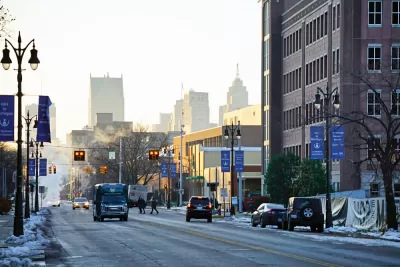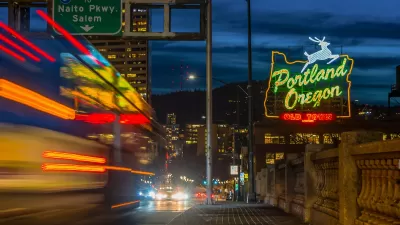A new web portal allows Detroiters to see how the city is spending hundreds of millions in federal American Rescue Plan Act funds.

Detroit is receiving $826 million in American Rescue Plan Act (ARPA) funds, and the city wants to ensure that the public can easily access information about how those funds are being spent, reports Dana Afana. To that end, "The city launched a website to show where the funding is being used and ways Detroiters can get involved. The city thus far programmed $530 million, which City Council approved in June 2021, and is moving forward with compliance reviews and more than 80 initiatives from 15 spending categories, according to the city."
Detroit's ARPA website also has a #TakePart element for residents to find information about community meetings, jobs and special alerts. The website also has a registration page for suppliers, a portal of available bid opportunities, and a section showing which contracts were approved by City Council and those that are pending.
The article lists ARPA-funded projects already underway, such as the Basement Back-up Program, affordable housing for seniors, expansion of social services, and job training and development programs. "Some of the upcoming ARPA-funded programs, which require further approvals and are expected to launch between the spring and fall, include neighborhood beautification grants, blight remediation, an arts alley initiative, Detroit at Work's Learn to Earn, recreation centers, restoration of the unused Detroit Fire Department Ladder 30 facility, Joe Louis Greenway, neighborhood signs and the Detroit Police Department Shot Spotter expansion."
FULL STORY: Detroiters can track how city is spending $826M in American Rescue Plan Act funds

Trump Administration Could Effectively End Housing Voucher Program
Federal officials are eyeing major cuts to the Section 8 program that helps millions of low-income households pay rent.

Planetizen Federal Action Tracker
A weekly monitor of how Trump’s orders and actions are impacting planners and planning in America.

Ken Jennings Launches Transit Web Series
The Jeopardy champ wants you to ride public transit.

Crime Continues to Drop on Philly, San Francisco Transit Systems
SEPTA and BART both saw significant declines in violent crime in the first quarter of 2025.

How South LA Green Spaces Power Community Health and Hope
Green spaces like South L.A. Wetlands Park are helping South Los Angeles residents promote healthy lifestyles, build community, and advocate for improvements that reflect local needs in historically underserved neighborhoods.

Sacramento Plans ‘Quick-Build’ Road Safety Projects
The city wants to accelerate small-scale safety improvements that use low-cost equipment to make an impact at dangerous intersections.
Urban Design for Planners 1: Software Tools
This six-course series explores essential urban design concepts using open source software and equips planners with the tools they need to participate fully in the urban design process.
Planning for Universal Design
Learn the tools for implementing Universal Design in planning regulations.
Heyer Gruel & Associates PA
Ada County Highway District
Institute for Housing and Urban Development Studies (IHS)
City of Grandview
Harvard GSD Executive Education
Toledo-Lucas County Plan Commissions
Salt Lake City
NYU Wagner Graduate School of Public Service





























